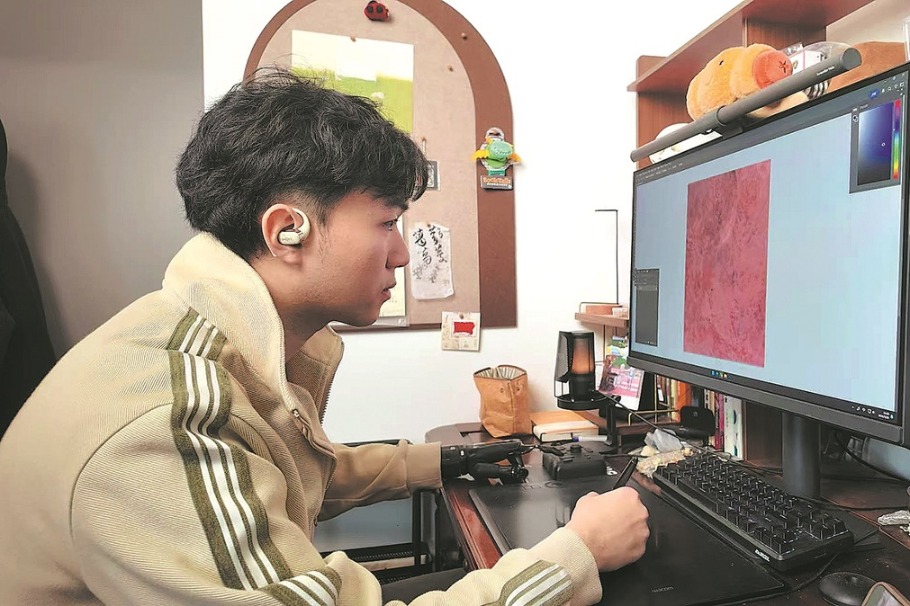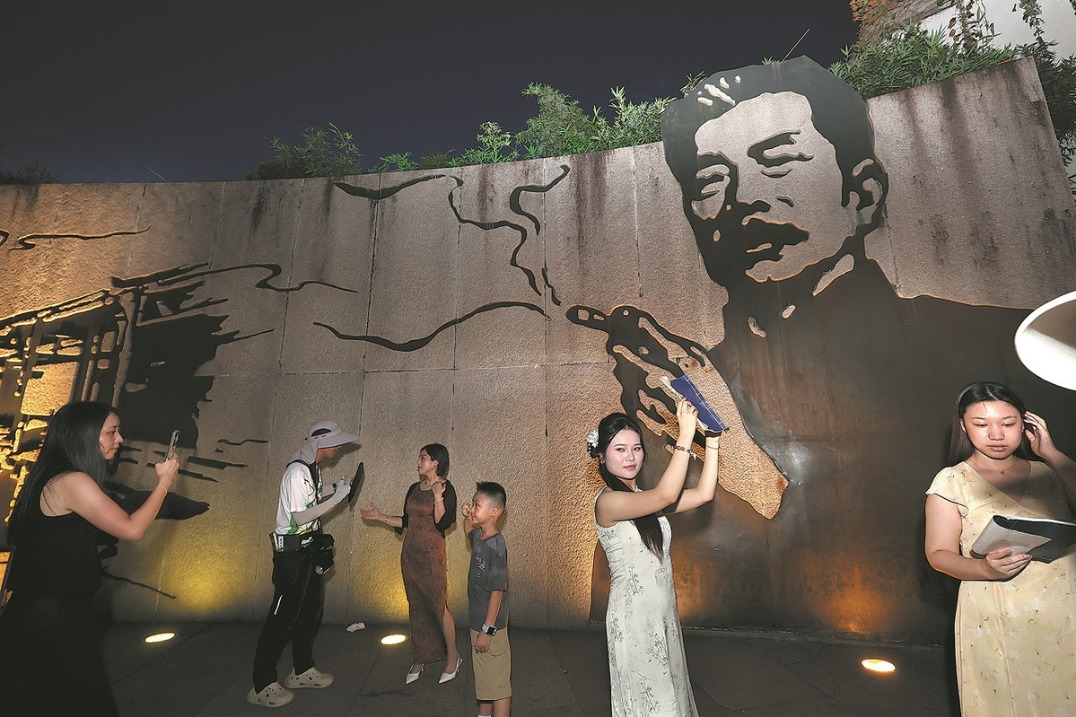A literal legacy set in stone
The former home of one of China's most celebrated poets, Du Fu, and a beautiful forest park, act not only as a tribute to his transient and fascinating life, but also his vast body of work, Huang Zhiling reports in Chengdu.

Most people read poems in books or online, but residents in Chengdu, Sichuan province, get to read 1,455 ancient poems on stone tablets.
First-time visitors to the Flower-bathing Brook Park in Chengdu will be impressed with the numerous tablets, each inscribed with a poem by Du Fu (712-770), one of China's most luminary poets. They are dotted all over the 32-hectare urban forest park — Chengdu's largest.
The characters are engraved by famous calligraphers dating from ancient times to the present day.
Together with poems inscribed on stone in the adjacent Du Fu Thatched Cottage Museum, those in the park are part of the Thousand-Poem Tablet Project, through which Chengdu has, quite literally, set the legacy of the Tang Dynasty (618-907) poet in stone.
With an investment of 150 million yuan ($21 million), the Chengdu municipal government's ambitious plan to erect tablets with Du's existing 1,455 poems in the park and museum started in 2015 and was completed in 2018.
The tablets collect Du's works from the many, varied stages of his life. Starting in his youth, they track his journey from the Tang capital of Chang'an (today's Xi'an in Shaanxi province), the musings he recorded in his prime and those from his short stint as a middle-aged vagrant in Gansu province. Also included are the poems he penned over nearly four years in his cottage in Chengdu, the two years he spent in today's Fengjie, Chongqing, from 766-768, all the way through to his final years in Hunan province before his death in 770.
According to Liu Xiaoli, a guide in the museum, Du was born into the family of an official, led a well-to-do life as a young man, but found himself in financial straits after his father passed away.
As an ambitious young man, in 736 he wrote the poem Looking at Taishan, when, as a 24-year-old, he lived an uninhibited, wandering life in what are present-day Henan, Hebei and Shandong provinces after failing the imperial examination the previous year. The poem reads:
One day I shall climb to the summit,
Seeing how small all peaks appear as they lie below me.
In order to become an official and realize his political ambition, Du spent nearly 10 years in Chang'an, only to reach the level of a petty bureaucrat. Having witnessed the sharp contrast between the haves and have-nots, the poor poet found that his youngest son had died of starvation when he visited his family in 755. He was so emotionally overwhelmed that he wrote the long poem Going from the Capital to Fengxian, which contains the time-honored lines:
There comes the reek of wines and meats that rot inside the gates of these rich;
The poor die frozen on the street.
The 20-hectare Du Fu Thatched Cottage Museum is built around the location in Chengdu where Du built his family cottage in 760 with the help of his friend, the official Yan Wu.
Du was a native of Gongxian in Henan province, who endured great hardships to move to Chengdu in 759, via Gansu province, as a refugee of an eight-year war started by two rebel generals in 755. On his way to defect to the emperor in today's Ningxia Hui autonomous region in 756, he was captured by rebels and taken to Chang'an. He managed to flee nearly one year later.
Seeing how Chang'an was ravaged by the rebel army, in February 757, Du wrote Spring View, while still in their custody. The melancholy poem describing his care for state affairs and concern for his loved ones reads thus:
Third month and still beacon fires flare,
Words from home would be worth their weight in gold.
The poet found peace at the Chengdu cottage for three years and nine months, penning 240 of his 1,455 poems.
His poem Good Rain on a Spring Night, written in 761, is prescribed reading for Chinese pupils.
The merry poem reads:
A good rain falling
Just when it should
In springtime; riding
On the wind it fills
A whole night, soaking
The land with its goodness.
Inside the museum are bronze statues depicting the happy scene described in the poem. Visitors are so attracted to the statue of Du's son, captured in a pose of holding rain with cupped hands, that they touch the boy's bronze fingers. Because so many people have done this, his hands shine like polished brass.
Despite his relatively happy days in the cottage, after a storm destroyed the cottage roof, he pondered the fate of other impoverished scholars, writing a poem declaring he could die content in his rustic abode if the less fortunate found shelter.
Known for his compassionate portrayals of human suffering, and indignation in the face of injustice and corruption, he wrote the famous poem Song of the Autumn Wind and the Thatched Cottage, in 761.
After the sudden death of Yan, Du's financial sponsor, in 765, the poet left Chengdu and reached Fengjie in Chongqing.
Thanks to the care of a leading local official, Du was able to live in Fengjie, and he attended to 100 hectares of public land. He also rented some public land and bought 2.7 hectares of orchards. He hired several workers, and, with his family, participated in some labor.
During that period, the poet composed his masterpiece On the Height, after climbing a high platform outside the city. The scenery of the Yangtze River in autumn reminded him of his transient life, the sadness of being old, ill and lonely.
Falling leaves rustle as they come through the air;
The Yangtze seems endless with its waters rolling on incessantly.
A thousand miles from home, I'm grieved at autumn's plight;
Sick for years, alone I'm on this height.
Homesick, Du left Fengjie by boat to reach Jiangling and Gong'an counties in Hubei in 768. At the end of that year, he drifted to Hunan province and climbed the Yueyang Tower by the Dongting Lake.
Facing the vast and magnificent lake, Du thought of his wandering in his later years and the disasters that had befallen the country. In an emotional state, he wrote the famous poem On Yueyang Tower.
Neither home folk nor friends have sent me any message;
Sick and old I can travel but by boat.
War is raging on the northern ends;
And I lean over the railings, shedding tears.
Because of financial difficulties, Du could not go north to his hometown Gongxian, and was stranded in Hunan. In the winter of 770, he perished on a small boat heading from today's Changsha to Yue-yang in Hunan.
According to museum curator Liu Hong, all the aforementioned poems written by Du can be found on stone in the Flower-bathing Brook Park and the Du Fu Thatched Cottage Museum.
Most of the tablets in the Thousand-Poem Tablet Project are made of Jiaxiang bluestone, quarried from a county in Shandong province known as the home of Chinese bluestone.
Engravers from Sichuan, Fujian, Shan-dong, Jiangsu and Shaanxi provinces competed to participate in the project. After strict appraisal, nearly 100 were chosen, Liu Hong says.
His museum provides an ideal vista all year round, for it abounds in lush forests and flowers in all four seasons.
A replica of Du's cottage was built in 1997 in line with the description in his poems. Famous local architect and painter Liu Weibing says the cottage resembles linpan, the traditional thatched-roofed houses of Sichuan farmers set amid bamboo forests and next to streams. Such dwellings have existed in the area for about 4,700 years.
Liu Weibing grew up among such dwellings and associates them with a slower pace of life.
The museum also houses a gigantic hall that displays Tang era relics discovered on the site in 2001, filling Chengdu's gap in the archaeology of large-scale Tang residential sites. They include bowls, chess pieces and metalware. Its eave tiles and bricks display patterns of flora and fauna.
Chen Tao contributed to this story.

































